As N.B. tries to move on from COVID-19, long COVID holds some back
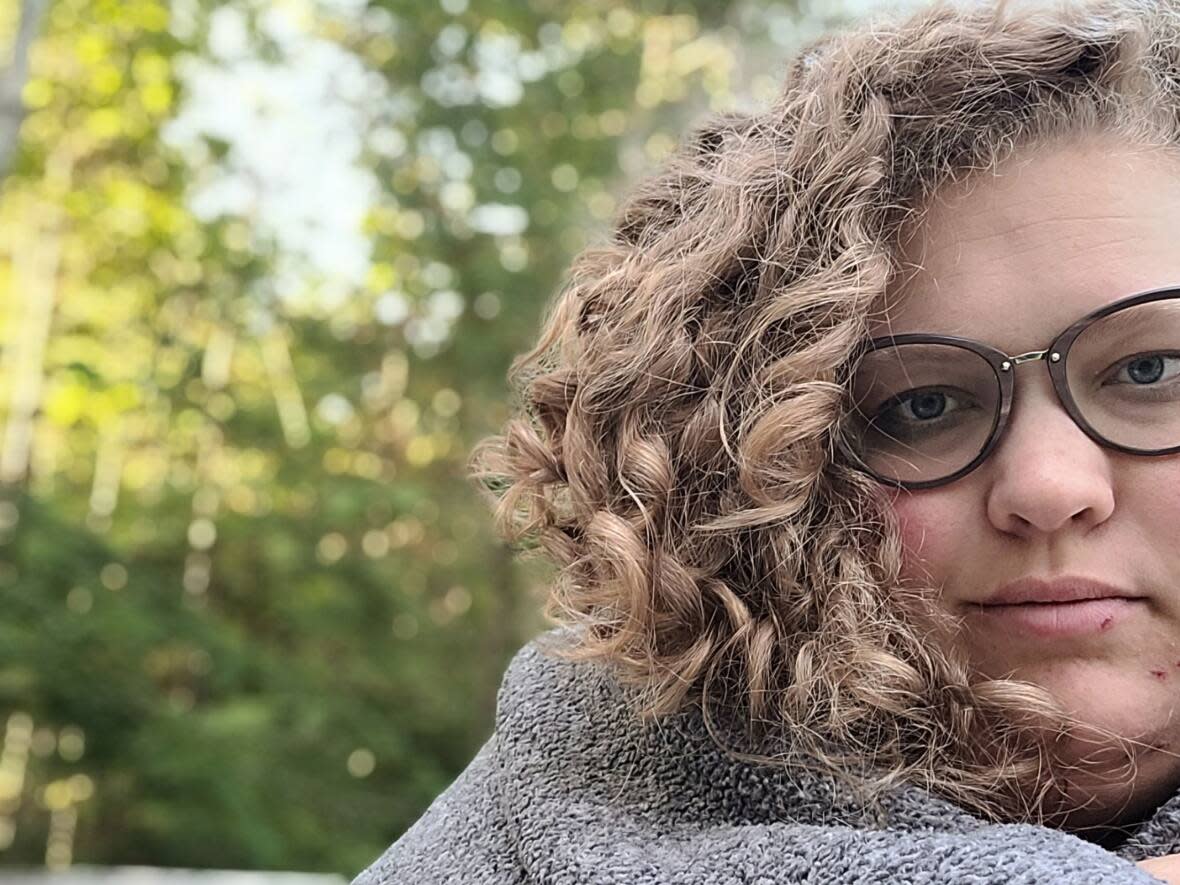
Three years into the COVID-19 pandemic, many New Brunswickers are anxious for life to return to "normal."
But some, like Sarah Ecker, fear their lives will never be the same.
Ecker, 34, of the Fredericton area, says she has long COVID, also known as post COVID-19 condition.
As a nurse for nine years and mother of two young children, she was used to being the one to take care of people. Now, it's often a struggle to get out of bed.
"I've always been an incredibly independent, strong-willed, capable, strong person," she said. "And to have my husband have to wash my hair sometimes because I'm too exhausted … that's hard."
It's not just the physical and neurological effects of long COVID, said Ecker, who has been unable to work for a year, since she tested positive for COVID-19.
"It affects your whole identity as a human being. It affects how you live your life and how you see yourself and how you see the world."
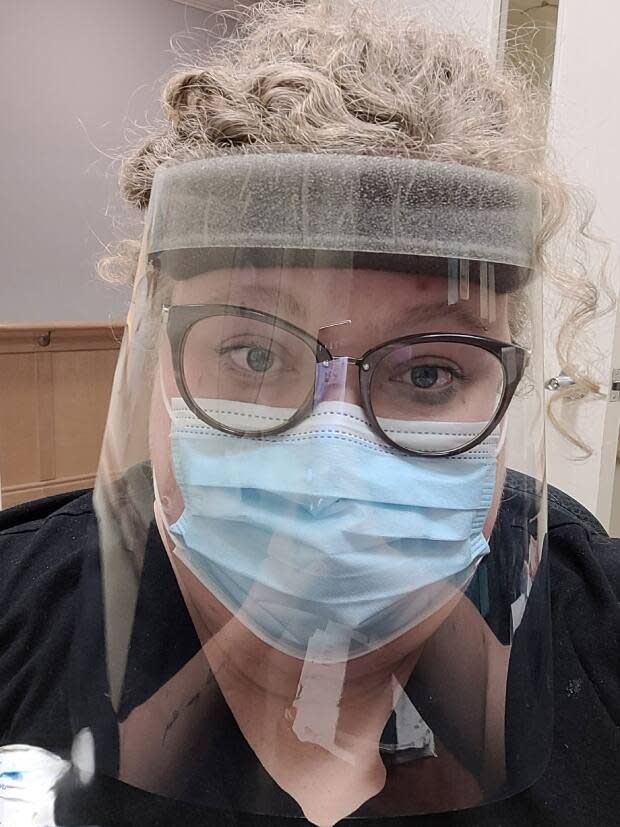
Ecker and advocates contend New Brunswick needs to follow the lead of other provinces and do more to help people suffering from long COVID — and soon.
The Department of Health says it's working on a plan but did not provide any timeline. Vitalité says a "provincial co-ordination service" that would allow for better management of patients is in the works.
Meanwhile, an infection control epidemiologist argues it's the medical community that needs to "step up" and work together to find solutions to present to government.
About 1.4 million Canadians affected
How many New Brunswickers suffer from long COVID is unclear.
"It's difficult to determine precise numbers … as many patients may experience symptoms differently," said Department of Health spokesperson Sean Hatchard. "Some would seek help from a health-care provider, while others may not.
"Many COVID-19 infections go unreported, and the process of diagnosing this condition is one that involves ruling out other issues, and may take time.
"And, since symptoms for post COVID-19 condition can range from very mild to severe, it's difficult to understand the full impacts at this time."
Across Canada, more than 1.4 million people — about 15 per cent of adults who have contracted COVID-19, as of August — say they experience symptoms, such as fatigue, shortness of breath and difficulty thinking or problem solving, three months or more after their initial infection, according to a survey by the federal government.
Almost 47 per cent experienced symptoms for a year or longer, and about 21 per cent said their symptoms often or always limited their daily activities.
Nearly 30,000 Canadians 18 or older completed the survey. Public Health Agency of Canada is also working with pediatricians to understand long COVID in children and youth through the Canadian Paediatric Surveillance Program, which launched a two-year study a year ago
New Brunswick launched a COVID registry early in the pandemic with Horizon and Vitalité to "track COVID-19 cases to determine what, if any, ongoing health changes are experienced by these individuals, how long they persist, and what specific changes from their baseline health have been noted."
The study ended a year ago, after 405 patients enrolled, Dr. Susan Brien, vice-president of medical, academic and research affairs for Horizon, said in an email.
"The initiative was discontinued due to a lack of funding and resources required to manage the registry on a permanent basis," she said.
Neither Horizon nor the Health Department responded to questions about the money or resources that would be required to maintain the registry or how much the initial effort cost.
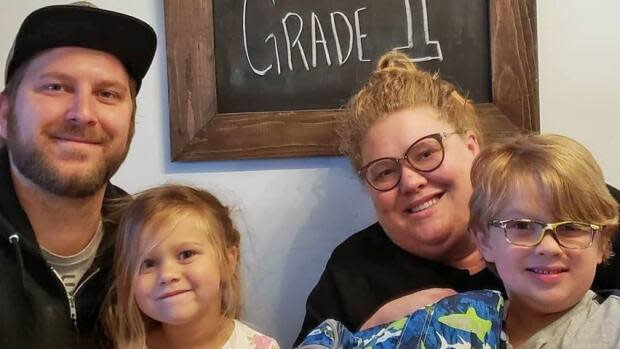
"The focus of this initiative was to create a standardized registry to track clinical features, treatment response and post-infection outcomes of individuals with COVID-19," said Brien.
People who agreed to be contacted for research purposes after a positive COVID-19 lab test were contacted by Horizon or Vitalité research staff and interviewed by phone.
After the initial interview, patients were then followed up with by phone to assess any ongoing COVID-19 symptoms.
"A coinciding study has been completed and publication is in progress," said Brien, who declined to provide more information.
'I just thought that I was an exhausted nurse'
Ecker said her COVID journey began early in 2020, when she worked at a nursing home and was struck with a high fever, aches, cough and shortness of breath. "I felt like I got hit by a truck."
Some co-workers and their family members also fell ill around that time, which was shortly before New Brunswick's first confirmed case of COVID-19 and the World Health Organization deemed the coronavirus outbreak a pandemic.
"We were all saying, 'What in the world is going around?' Like, 'None of us have ever experienced anything like this.'"
COVID testing wasn't available, but Ecker believes that's what she had. She stayed home about a week and when she went back to work, she started "having all of these strange issues."

She couldn't walk the length of a hallway without breaking into a sweat and having to sit down to catch her breath.
"Any amount of exertion — mental, emotional or physical — would just cause me to have like complete energy collapse."
She also had stomach pain and gastrointestinal issues.
Ecker pushed herself because once the pandemic hit, work was even more challenging.
"I just thought that I was an exhausted nurse. I have two little kids. And you know, life was hard and stressful. I thought I was burning out."
It didn't explain all her symptoms, but "nobody knew long COVID was a thing."
Had to relearn how to remember, plan
By October, she'd taken sick leave.
"My cognitive ability had declined so much and my executive [functionality], which obviously I highly depended on as a nurse and a mom, it was just like gone."
She had to go to an occupational therapist to "relearn how to remember stuff and plan and organize," she said.
"Everything that would come natural to me my whole life was now something that I had to, like, fight to do."
After five months she returned to work but reduced her hours to casual.
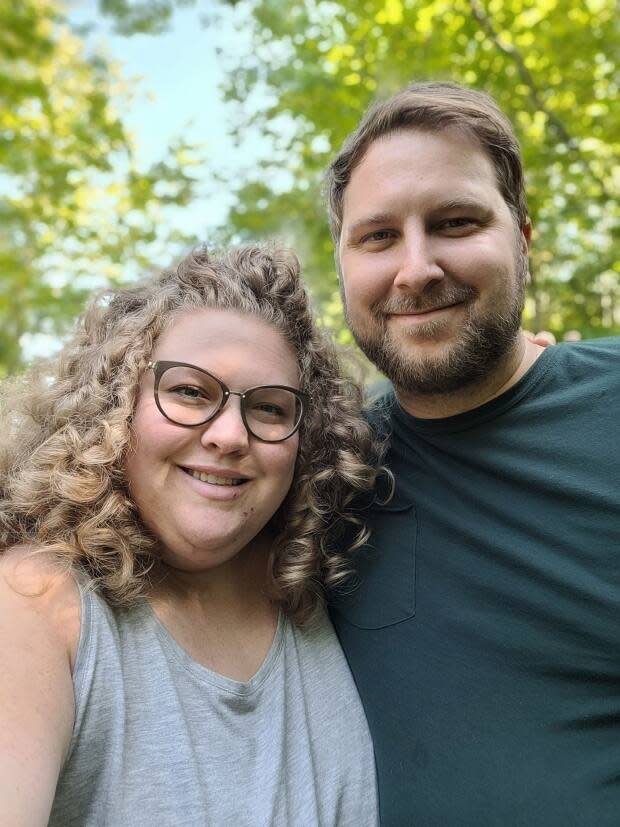
She later switched jobs and worked part time until she got COVID again last March, after New Brunswick dropped all of its protective COVID measures, such as masking in schools and mandatory isolation.
It "flared up" her previous symptoms and brought on more neurological ones, she said, and she hasn't been able to work since.
On a "good day," all she can manage is to get up, shower and make supper for her family.
Her sick time ran out, and she never applied for workers' compensation because she never imagined she would be off for so long.
Still, she considers herself one of the lucky ones. She has an "amazing" doctor, loved ones who help and support her, and an understanding social network.
'A lot of just no answers'
Haley Flaro, executive director of Ability New Brunswick, said the province lacks information and support for people with long COVID.
Her organization, which tries to help people with mobility disabilities be full community participants, has seen an increase in people with suspected long COVID seeking help over the past year and a half, she said.
"There's been a lot of questions, a lot of concerns and a lot of just no answers."
Flaro said they've had to rely on information from other provinces, such as Alberta, to advise people on what to ask their doctors to get help.
New Brunswick's long COVID webpage, launched last November, is disappointing, she said. "It does not address the major life changes people are experiencing and what type of specialist care they should be seeking to confirm their diagnosis [and] look at treatment plans."
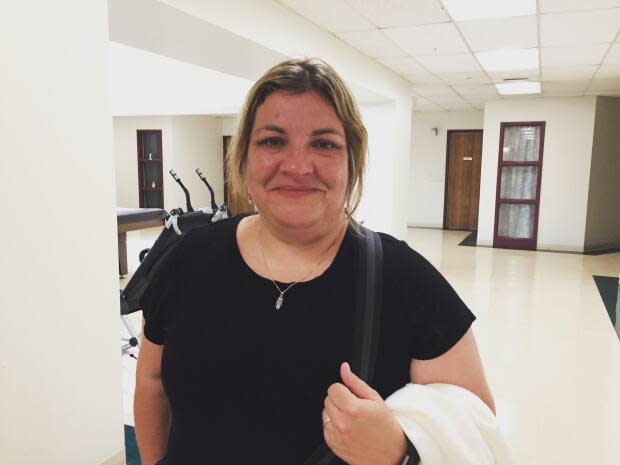
The website was launched after the PoP (Protect our Province) NB advocacy group released hundreds of pages of government documents obtained through right to information, which showed the government had been receiving information about long COVID since July 2020.
Among them was an email the executive director of Public Health's COVID response team sent to health officials regarding an inquiry from Ability New Brunswick.
Imagine yourself, all of a sudden tomorrow you're having difficulty speaking, moving, tired. You can't go to work. Like, this is serious stuff. - Haley Flaro, Ability New Brunswick
"AbilityNB has indicated that they have 'started to see referrals of individuals experiencing possible effects of long COVID-19 with symptoms impacting mobility' … Do we have any concerns (I am thinking liability) that individuals are being treated/diagnosed as long COVID without a case definition?"
Flaro said she was "gutted" to see that and doesn't "give a crap about liability issues."
"We care about getting people … solid health information solid social service information.
"Imagine yourself, all of a sudden tomorrow you're having difficulty speaking, moving, tired. You can't go to work."
She acknowledged there are still many unknowns, but noted some provinces, such as Ontario, have established long COVID clinics, and thinks New Brunswick should as well.
Advisory group and working committee
The Health Department said it is supporting the two health networks to develop resources to help care for long COVID patients.
The department, Horizon and Vitalité have formed an advisory group that will "provide expertise and advice on treatment," said Hatchard.
A working committee, with members from both networks, will "support the advisory group's work, help determine how to best meet the needs of New Brunswickers, and align health care services," he said.
Hatchard did not respond to questions about the expertise of the members or whether they've been given a deadline.
Vitalité spokesperson Brigitte Sonier-Ferguson said the department is collaborating with Horizon and Vitalité to establish a provincial co-ordination service for people with long COVID.
Specialists need to work together
Colin Furness, an infection control epidemiologist and assistant professor at the University of Toronto, said he's "not shy about criticizing politicians when they need to be criticized."
But long COVID is a "mushy" issue.
"So you go to government and say, 'We're not sure how big the problem is, we're not even sure how to define the problem, and we're not really sure what the inclusion criteria should be, but we should probably help these people.' That's a hard sell, right, because it's very, very hard to make it actionable."
Furness contends the medical community needs to get a better handle on long COVID first.

Part of the problem, he said, is the various specialities don't work together in an interdisciplinary way.
"Who is the long COVID specialist? That medical specialization doesn't exist because you would actually have to be part immunologist, part vascular physician, part internal medicine, part neurologist."
Federal funding announced
Federal Health Minister Jean-Yves Duclos recently announced $20 million from the Canadian Institutes of Health Research would go to support a pan-Canadian Post COVID-19 Condition Research Network called Long COVID Web. Another $9 million, from the Public Health Agency of Canada, is going to Cochrane Canada and GRADE centres at McMaster University to develop clinical practice guidelines.
The Long COVID Web research network will work with more than 300 researchers, clinicians, people who've experienced COVID-19, partners and representatives from Indigenous communities to develop accurate diagnostics, treatments, and rehabilitation strategies.
Cochrane Canada and the GRADE centres will develop and evaluate six evidence-based health guidelines on long COVID. They'll be published in 2024 and include identifying the condition, prevention, assessment, management and monitoring of people with long COVID.
The federal government also added a new web page on long COVID for health professionals.


